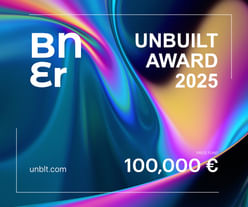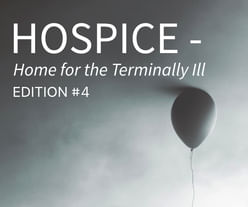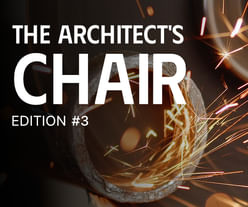
The World Architecture Festival (WAF) has announced the inaugural winners of its brand-new Architecture Book of the Year Awards. The program honors seven select Category Winners along with three Special Prizes as selected by an esteemed panel of judges from more than 100 entries of architecture books published between 2020 and last year.
The awards are put on in collaboration with The Worshipful Company of Chartered Architects and Temple Bar Trust and will name an overall winner in September in advance of the three-day festival, which begins on November 29th in Singapore.
The WAF shared: "Judges, a mixture of academics, practicing architects and critics, made their decision based on (a) quality of content – the primary consideration; (b) quality of design; and (c) production values." Winners were selected across seven categories with three added special prize recognitions. Winning authors include Justin Beal, Stefi Orazi, and Fabio Barry.
The full list of awardees, with jury citations can be viewed below.
HISTORY CATEGORY
Winner: Painting in Stone by Fabio Barry (Yale University Press)
Jury citation: “This remarkable book provides a tour de force account of the different ways in which marble was used as a building material from the earliest urban civilisations up until the Italian Baroque. Exquisitely illustrated, the text’s insightful analysis and temporal sweep are deeply impressive. The author traces the contribution of marble not merely in terms of its own intrinsic aesthetic qualities, but also how this stone is able to modulate light to create intangible and ephemeral architectural effects"
Highly commended: Architecture in Global Socialism by Lukasz Stanek (Princeton University Press)
Jury citation: “In proposing that architects in the former Soviet Bloc were engaged during the Cold War era in constructing alternative models not merely at home but also abroad – which the author terms ‘socialist worldmaking’ – this innovative examination of cities in Africa and the Middle East reveals the range and diversity of buildings created by protagonists from socialist countries for those living in the so-called ‘Third World’.”
BIOGRAPHY/AUTOBIOGRAPHY CATEGORY
Winner: Sandfuture by Justin Beal (MIT Press)
Jury citation: “Sandfuture is remarkable and original. What could have been another narcissistic account is a fascinating description of the tension between the formal assuredness and psychological fragility that illuminates the myriad difficulties of Minoru Yamasaki’s career. Justin Beal’s interweaving of vignettes from his own life as architect-artist-writer with Yamasaki’s, between the totemic catastrophes of Pruitt Igoe and the World Trade Center, is extraordinarily resonant, charting our disenchantment with Utopian Modernism. Something profound about our fallible lust to improve life is unveiled as Beal interpolates his own and his partner’s physical experiences, to good, if sometimes puzzling, effect. Recommended for anyone thinking about a life in architecture.”
Highly commended: Lives in Architecture: Nigel Coates by Nigel Coates (RIBA Publishing)
Jury citation: “Making his name early at the AA, Nigel Coates set out to liberate architecture from its macho-techno stays, leaping theatrically beyond PoMo’s stilted puns. For which he remains unforgiven, despite the enthusiasm with which his accessible, emotive ‘narrative’ architecture was embraced, particularly in Tokyo. He presents himself in a scenography of shifting taste and style, pedagogic and professional, subtly undermined (no more than hinted at) by prejudice and naysaying. There is surely no other architect who could with such brio, drop so many names from the cultural demi-monde. Written in his house above Italy’s Val d’Orcia in the pandemic, the book’s mood of quiet reflection provides a gentle coda to a hitherto hectic life. Coates provides a vivid, perceptive account of a key period in which the orthodoxies had a run for their money. A thoughtful, generous, rebel-with-a-cause dedicated to the hedonistic challenging of mediocrity and conformity. Bravo."
MONOGRAPH (BUILDING) CATEGORY
Winner: Golden Lane Estate: An Urban Village by Stefi Orazi (Batsford)
Jury citation: “This book was judged to be refreshingly independent, being both celebratory but also critical at times of the estate’s design. It was particularly praised for bridging the gap between a general and specialist audience, as well as for the clarity of its design and success of its ‘collage-like’ structure, with four distinct sections – history / interviews with residents / photography / plans – working well together to provide a broad perspective on the scheme. The clear presentation of plans was particularly liked, underlining how, though this is a 60-year-old scheme, its design and planning still provides valuable lessons for today in how good housing can be an enabler of a good life for its residents.”
Highly commended: The City Works: Eric Parry Architects edited by Ian Latham and Chris Foges (Right Angle Publishing)
Jury citation: “This book was commended for its beautiful design. It was liked for its thorough analysis of a series of schemes while also being a book that could be ‘dipped into’, offering useful insights on many aspects of the planning and design process: ranging from the differences between working in Westminster vs City, to commissioning and working with artists. Judged as being an exemplar of an architects’ own monograph that is ‘more than just a PR job’, it provides a rich perspective on a body of work, that is usefully greater than the sum of its parts.”
MONOGRAPH (TYPOLOGY) CATEGORY
Winner: Scotland’s Rural Home: Nine Stories about Contemporary Architecture by John Brennan (Lund Humphries)
Jury citation: “One of remarkably few of the entries to try to define a typology, this book explores a selection of recently completed homes in the Scottish countryside. A few are additions to existing structures, some of them ruinous and in enviable settings. All are well illustrated with specially drawn plans and occasional sections which makes some architectural analysis possible. The texts are well written and clear, fulfilling the promise of the subtitle. Given the topicality of Scottish identity, the book opens a discussion about the extent to which contemporary rural architecture, working alongside its wonderful landscape, might help to define it.”
MONOGRAPH (PRACTICE) CATEGORY
Winner: Being Ted Cullinan edited by Ian Latham (Right Angle Publishing)
Jury citation: “Produced as a tribute to the late Ted Cullinan, one of the leading architects of his generation, this slim but dense collection of essays by peers, friends and historians offers a rare depth of insight into its subject. Taken together, the mix of anecdote and analysis provides a detailed overview of Cullinan's life, work and influence, but it's equally rewarding to open at any page and start reading.”
Highly commended: Evans + Shalev introduction by Joseph Rykwert (Circa Press)
Jury citation: “This carefully assembled and beautifully designed survey of built and unbuilt works by Evans + Shalev has a rigorous order and elegance that match its subject. With an emphasis on visual information – particularly drawings – it stood out for the judicious selection of material and consistency of presentation."
TECHNICAL CATEGORY
Winner: Modern Architecture and Climate by Daniel A Barber (Princeton University Press)
Jury citation: “A meticulously researched and beautifully written account of 60 years of clever design by modernist architects whose buildings were ‘environmental filters’. It alters perspective on twentieth-century architecture – revealing fundamental principles and false trails – to stimulate and inspire as a consequence. This is a very well-researched book about façade design as an integrated climate moderating system; its references to mid-20th century architecture provide a worthwhile technical reference for architects designing for today’s climate emergency.”
CITY/COUNTRY GUIDE CATEGORY
Winner: Queer Spaces: An Atlas of LGBTQIA+ Places and Stories by Adam Nathaniel Furman and Joshua Mardell (RIBA Publishing)
Jury citation “Charting new territory for our discipline and in a guidebook layout/format, it is clearly a passion project. Its purpose is very clear, expressed in the introduction, offering a deeper reading of the way countries adopt and carve out safe space in cities. We liked its international scope and range of visual representation and voices – definitely a book for and of our time.”
SPECIAL PRIZE WINNERS CATEGORY
Sir Banister Fletcher’s Global History of Architecture by Murray Fraser (general editor) and Catherine Gregg (managing editor) (Bloomsbury/ RIBA/ University of London)
Jury citation: “The 21st edition of this classic work, in two impressive volumes, is a testament to the ongoing commitment to continuity of architectural publishing and to the history of an increasingly complex subject."
Speculations: Peter Cook by Peter Cook with contributions from Katrin Förster, Frank Gehry, Toyo Ito, Thom Mayne and Peter Wilson (Circa Press)
Jury citation: “Beautifully produced, this visual treat is a reminder of the power of architectural drawing and painting to inform the process of design, and to investigate conditions and contexts beyond conventional methods of analysis.”
A posthumous award was also given to late historian/theorist Elain Harwood, to which the jury stated: “Elain was one of our judges for this year’s awards, and her premature and unexpected death was a shock to her fellow judges and to the world of architecture as a whole. Two of her books were eligible for this year’s awards, but we decided it would be more appropriate to award a special prize, in the hope that this may be a precedent for future awards, with her name attached, related to 20th century British architecture.”
Looking for other books to dive into this summer? Be sure to check out Archinect's 2023 Summer Reading List!

100,000 € Prize / Buildner's Unbuilt Award 2025
Register by Thu, Oct 30, 2025
Submit by Thu, Nov 20, 2025

Hospice - Home for Terminally Ill #4
Register by Wed, Jan 15, 2025
Submit by Mon, Jun 16, 2025

The Architect's Chair / Edition #3
Register by Wed, Jan 15, 2025
Submit by Tue, Feb 18, 2025

2025 Concrete Masonry Competition
Register by Wed, Apr 9, 2025
Submit by Wed, Jun 4, 2025
No Comments